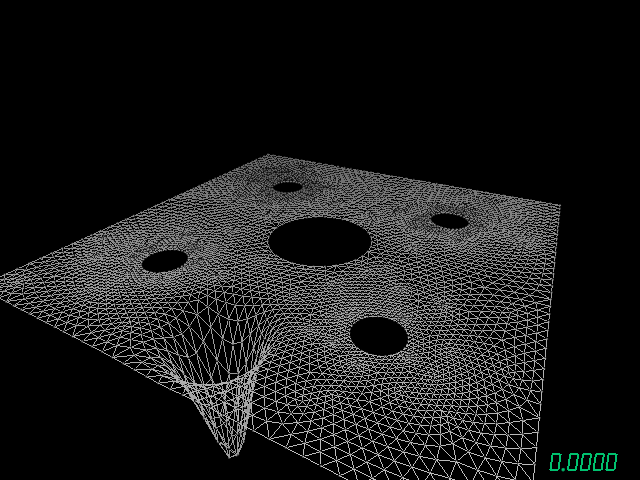- Ye Kuang <yekuang@g.harvard.edu>
- Dustin Tran <dtran@g.harvard.edu>
make shallow_water
./shallow_water data/pond3.nodes data/pond3.tris 0One can run the mesh on each of the three initial conditions by specifying 0
(a pebble ripple), 1 (a sharp wave), or 2 (a dam break) for the third
argument of the shallow_water binary; by default it uses the DamBreak
condition.
Also check out k-ye/mcmc-viz, which uses the mesh design to build a visualization tool for Markov chain Monte Carlo.
We store a Graph object templated with node value type (double by default)
and edge value type MeshEdgeValue. MeshEdgeValue stores the left and right
triangles of an edge (chosen such that the left triangle corresponds to the one
left of the vector from node i to the node j, where i<j), and also the
template E, which is the edge value type one originally stores in a graph edge
(double by default).
The way we determine whether a triangle is on the left or right side of the edge
is to calculate the cross product of the edge and the vector formed by the third
node of the triangle. If the result is positive, then we will store the triangle
to the right, otherwise it will be left. This is called Winged Edge Data Structure, which is a super efficient way of designing triangle-based mesh that
allows every operation to be O(1).
We also store a vector of internal_triangle objects, whose index refers to a
triangle's index, and the internal triangle data refers to the associated
information for each triangle.
In order to iterate through all the triangles inside a Mesh, we define a class
called TriangleIterator. which stores a pointer Mesh* and a index_, which
points to the index of triangle being visited currently in that mesh.
As for the iteration of all the adjacent triangles of Node and Triangle, we
define a class called NodeTriangleIterator and TriTriangleIterator, which
stores a pointer Mesh* and one or two indices in order to keep track of the
iterative procedure during incrementing and dereferencing.
To avoid redundancy when setting up multiple initial conditions (and mostly for fun), we implement a Curiously Recursive Template Pattern. This constructs a base class from which each initial condition's class can inherit from, allowing the initial conditions to merely state the changes done onto node values, and then we run the same code to propagate this to the other values.
